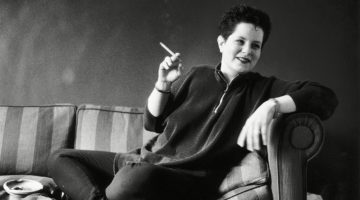Interview: Director Shawn Linden and Thomas Dekker discuss 'The Good Lie'
It was a role conceived for him from the start, a character that requires the actor to be possessive of a polarizing duality. One half of him is sympathetic, endearing, and earnest – he’s a young man with questions about family and life, looking to be a good son, friend, and person. The other half is something else entirely, as an aimless vengeance takes over, losing control and heading with full steam to no place in particular. He ignores those that seek to help while getting in harm’s way.
Thomas Dekker assumes the compelling role of Cullen Francis, a young man who, upon the sudden death of his loving mother, learns from a posthumous video that he is the product of a rape. In one moment Cullen is a seemingly average youth, arguing with his parents and living a social existence. In the next he is someone else, as if the dramatic realization awakens the darker side of him, the side of him that was contributed by an unknown assailant.
Dekker, a 25-year-old actor who has worked in film and television in the United States and Canada, notably in shows such as Terminator: The Sarah Connor Chronicles and The Secret Circle, was in the mind of writer and director Shawn Linden at the beginning.
“I was very curious, and so when I read it, I thought it was a very good fit,” explained Dekker while in Toronto. “I was drawn to it because I hadn’t read anything quite like it, it was surprise after surprise. The journey the character goes on is like cake for the actor, there are so many different emotional turns.”
The journey Dekker speaks of is a lengthy one, and one without a destination. Cullen wants to meet his biological father, traveling across a lonely night in search of answers, and some sort of resolution. He is hardheaded, yet caring, angry yet confused, brave yet naïve.
“[Cullen] is a product of a really good person and a really bad person, an angel and a devil,” says Linden. “I wanted someone who can personify both of those things at once. [Thomas] is a brooding person with a warm face, and can have these two different elements that are always at work.”
Dekker laughs as Linden offers this description, and there is a tacit understanding that its Dekker’s acting ability that allows him to possess both a darkness and a lightness. At certain moments, though, Dekker seems to have become a thoughtful, agonizing introvert just like his character.
“There was a time you look shattered walking around with headphones on,” says Linden to Dekker of his behavior on set during a shooting of a campfire scene. It’s a narrative that runs parallel to Cullen’s journey, as he and a group of friends spend a night in the woods telling tall tales.
As Cullen searches, his stepfather follows, though always a step behind. The relationship between the two is key, despite not spending a great deal of time on screen together. Linden, Dekker, and Matt Craven, who plays Cullen’s father Richard, worked together to shape the attitude and personality of Cullen, fleshing out a realistic character so that Dekker could inhabit him completely, acting and reacting to the world around him.
“Watching the tape of his mother is a perfect example of really just reacting to something,” explains Dekker. “I was allowed in one shot to go from one emotion to the other, and if you’re open to what you’re actually experiencing, you don’t have to fabricate too much.”
Across a month shooting in both Montreal and Winnipeg, Dekker became Cullen Francis, a conflicted young man no longer a child but not yet an adult. Headstrong and blinded with confusion, rage, and whatever other imaginable emotions go into discovering your father is a rapist, Dekker goes on a powerful quest in this intimate, memorable Canadian film. It hit Dekker too, emotionally, and physically at times.
“I felt pretty beat up at the end of it,” he says. “For better or worse, as an actor, you get to experience things you hope you never have to really experience.”





